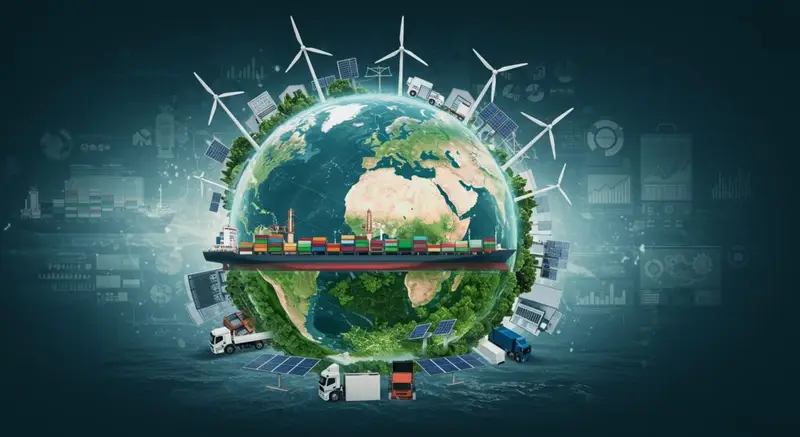Sustainable Logistics: What Students Learn at MSc Level
The global economy increasingly demands efficient yet environmentally responsible practices. For aspiring leaders in logistics and supply chain management, understanding sustainable SCM is no longer optional—it’s imperative. MSc programs in this field are designed to equip students with the knowledge and tools to navigate this complex landscape, balancing economic viability with ecological and social responsibility. From optimizing routes to sourcing ethically, these advanced studies delve deep into how businesses can create value while minimizing their footprint.
Table of Contents
- Why Sustainable SCM Matters More Than Ever
- Core Curriculum in Sustainable SCM Programs
- Practical Application and Research Opportunities
- Career Prospects for Graduates
- The Future of Sustainable Logistics
Why Sustainable SCM Matters More Than Ever
In an era defined by climate change, resource scarcity, and heightened consumer awareness, the traditional supply chain model is undergoing a profound transformation. Businesses face mounting pressure from regulators, investors, and customers to adopt more sustainable practices. This shift isn’t just about compliance; it’s about competitive advantage, risk mitigation, and brand reputation. MSc students learn that integrating sustainability into supply chain operations can lead to cost savings through reduced waste, improved efficiency, and enhanced stakeholder relationships. They explore the intricate balance required to achieve economic prosperity without compromising the planet’s health or social equity.
Core Curriculum in Sustainable SCM Programs
MSc programs in sustainable logistics provide a comprehensive overview of the principles, methodologies, and technologies driving greener supply chains. The curriculum typically covers a wide array of topics, ensuring graduates are well-rounded experts.
Foundations of Green Logistics
Students begin by understanding the fundamental concepts of green logistics, including transportation optimization, warehousing efficiency, and reverse logistics. They examine how to reduce emissions, conserve energy, and manage waste across the entire supply chain network. This includes exploring alternative fuels, electric vehicle fleets, and the strategic placement of distribution centers to minimize travel distances.
Measuring Environmental Impact: Metrics and Analytics
A crucial component of sustainable SCM is the ability to quantify environmental performance. MSc students are trained in various methodologies for measuring carbon footprint, water usage, and other environmental indicators. They learn to utilize data analytics tools to assess the impact of different supply chain decisions and to identify areas for improvement. This involves understanding life cycle assessment (LCA) and environmental management systems (EMS).
Circular Economy Principles in Supply Chains
Moving beyond the linear ‘take-make-dispose’ model, students delve into the principles of the circular economy. This involves designing products for durability, reusability, and recyclability, and implementing closed-loop supply chains. They study strategies such as remanufacturing, recycling programs, and product-as-a-service models to maximize resource utilization and minimize waste generation throughout a product’s lifecycle.
Ethical Sourcing and Social Responsibility
Sustainability extends beyond environmental concerns to encompass social equity and ethical practices. MSc programs address responsible sourcing, labor rights, and fair trade. Students learn how to audit suppliers, manage supply chain risks related to human rights, and ensure transparency and accountability across complex global networks. This often involves understanding international standards and certifications.
Technology and Innovation for Sustainable SCM
Technological advancements are pivotal for achieving truly sustainable SCM. Students explore how innovations like Artificial Intelligence (AI), blockchain, the Internet of Things (IoT), and big data analytics can optimize supply chain operations, enhance visibility, and enable better decision-making for sustainability goals. For example, AI can predict demand more accurately, reducing overproduction, while blockchain can ensure traceability and ethical compliance of products.
Practical Application and Research Opportunities
Beyond theoretical knowledge, MSc programs emphasize practical application. Students often engage in case studies, real-world projects, and simulations that mimic actual supply chain challenges. Many programs also include significant research components, such as a dissertation or thesis, allowing students to specialize in areas like sustainable urban logistics, disaster relief supply chains, or the economics of green innovation. This hands-on experience is invaluable for developing problem-solving skills and preparing for industry roles.
Here’s a comparison of traditional vs. sustainable logistics considerations:
| Aspect | Traditional Logistics Focus | Sustainable Logistics Focus |
|---|---|---|
| Primary Goal | Cost minimization, speed | Triple Bottom Line (People, Planet, Profit) |
| Transportation | Lowest cost/fastest route | Optimized routes, low-emission modes, consolidation |
| Warehousing | Storage capacity, operational efficiency | Energy efficiency, smart layouts, waste reduction |
| Sourcing | Lowest price, availability | Ethical labor, environmental impact, local sourcing |
| Waste Management | Disposal | Reduction, reuse, recycling, circularity |
| Transparency | Limited to immediate partners | End-to-end visibility, traceability |
Career Prospects for Graduates
Graduates with an MSc in sustainable logistics are highly sought after in a rapidly evolving job market. They can pursue roles such as Sustainability Manager, Supply Chain Analyst, Green Logistics Consultant, Operations Manager, or Environmental Compliance Officer. Industries ranging from manufacturing and retail to consulting and non-profits are actively seeking professionals who can drive environmental stewardship and operational excellence. The skills acquired are transferable across sectors, offering a wide array of career paths. For more resources on developing a green career, consider visiting EnvironmentalCareer.com.
Understanding these career paths can help students align their academic focus with future ambitions. For broader insights into effective supply chain management strategies, you might find our article on Optimizing Supply Chain Efficiency particularly helpful.
The Future of Sustainable Logistics
The field of sustainable logistics is dynamic and continuously evolving. As global challenges intensify, the demand for innovative solutions and skilled professionals will only grow. MSc programs prepare students not just to adapt to these changes but to lead them, fostering a generation of supply chain managers committed to building more resilient, ethical, and environmentally friendly systems for a sustainable future.

